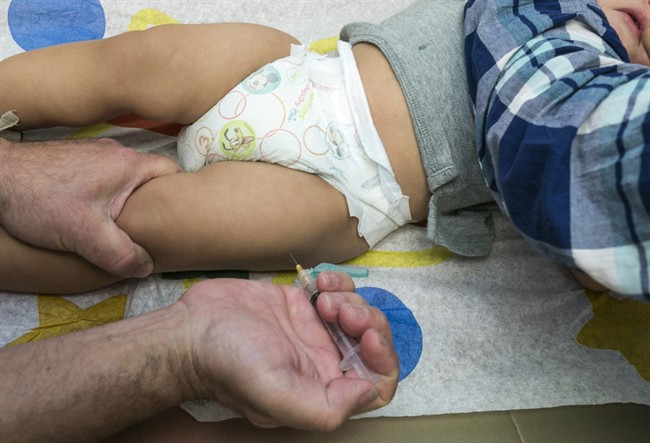Even a small decrease in vaccinations can result in the cases of measles to spike, according to a new study.

Using a modelling study of children aged two to 10, researchers from Stanford University and the Baylor College of Medicine found that a five per cent reduction in the measles, mumps, and rubella (MMR) vaccine is likely to result in a three-fold increase in measles cases in the U.S., with a cost pegged at $2.1 million.
READ MORE: Deadly measles outbreak spreads in Europe as vaccinations fall
Researchers used publicly available data from the U.S. Centers for Disease Control and Prevention (CDC) to simulate county-level vaccine coverage.
“Given increasing parental decisions to not vaccinate their children, we wanted to understand the effect of small reductions in vaccine coverage on overall measles cases,” said study co-author Nathan Lo of Stanford University School of Medicine in California, in an email to Reuters.
“We found that small declines in vaccine coverage can really reduce the ‘herd immunity’ effect and result in more frequent and larger outbreaks of measles,” Lo said.
Dropping vaccination rates have prompted firm measures and policies in countries around the world.

Get weekly health news
The No Jab, No Pay bill in Australia, strips families of up to $15,000 AUD in annual benefits if they don’t get vaccinated. In Germany, kindergartens are obligated to report parents who haven’t sought vaccination advice from a doctor.
Measles is a highly contagious and potentially fatal disease that can spread very easily, particularly to those who are not immune or are vulnerable. It can spread through direct contact, through the air via a cough or sneeze, or by way of contact with shared objects and surfaces.
Anyone who has not had two doses of the vaccine or has not had measles in the past is at risk of infection. Infants, pregnant women and those with weakened immune systems can become very ill with measles.
WATCH: New outbreaks of measles and mumps reported across Canada

In 2000, the United States achieved measles elimination thanks to high immunization rates. Since then, the anti-vaxxing movement along with the notion that measles is no longer a threat has seen rates drop.
READ: How fading dread of deadly diseases could let them stage a comeback
Vaccination rates have particularly been declining in areas of the U.S. where individuals are allowed to exempt their children from vaccinations due to personal, religious or other non-medical reasons, study authors note.
The authors advise against relaxing vaccine requirement in order to stem this trend.
“Given trends in declining vaccine coverage, our study predicts that removal of non-medical personal belief exemptions would substantially reduce the risk of measles in the United States,” noted researchers.
— With files from Reuters










Comments
Want to discuss? Please read our Commenting Policy first.